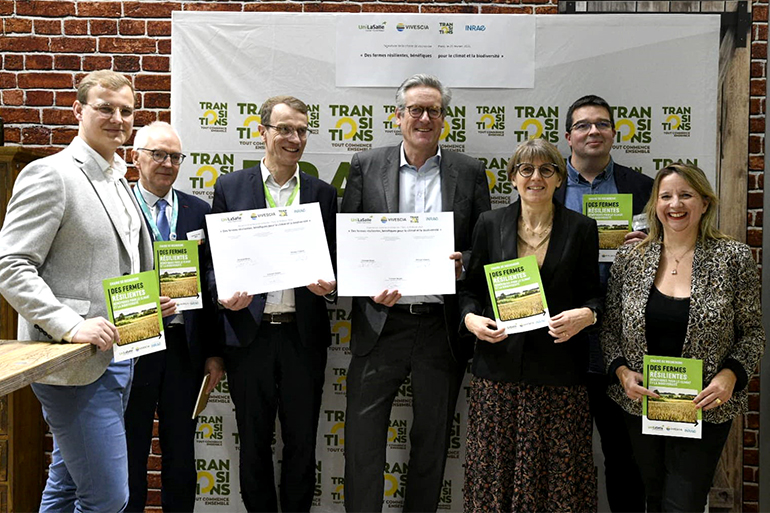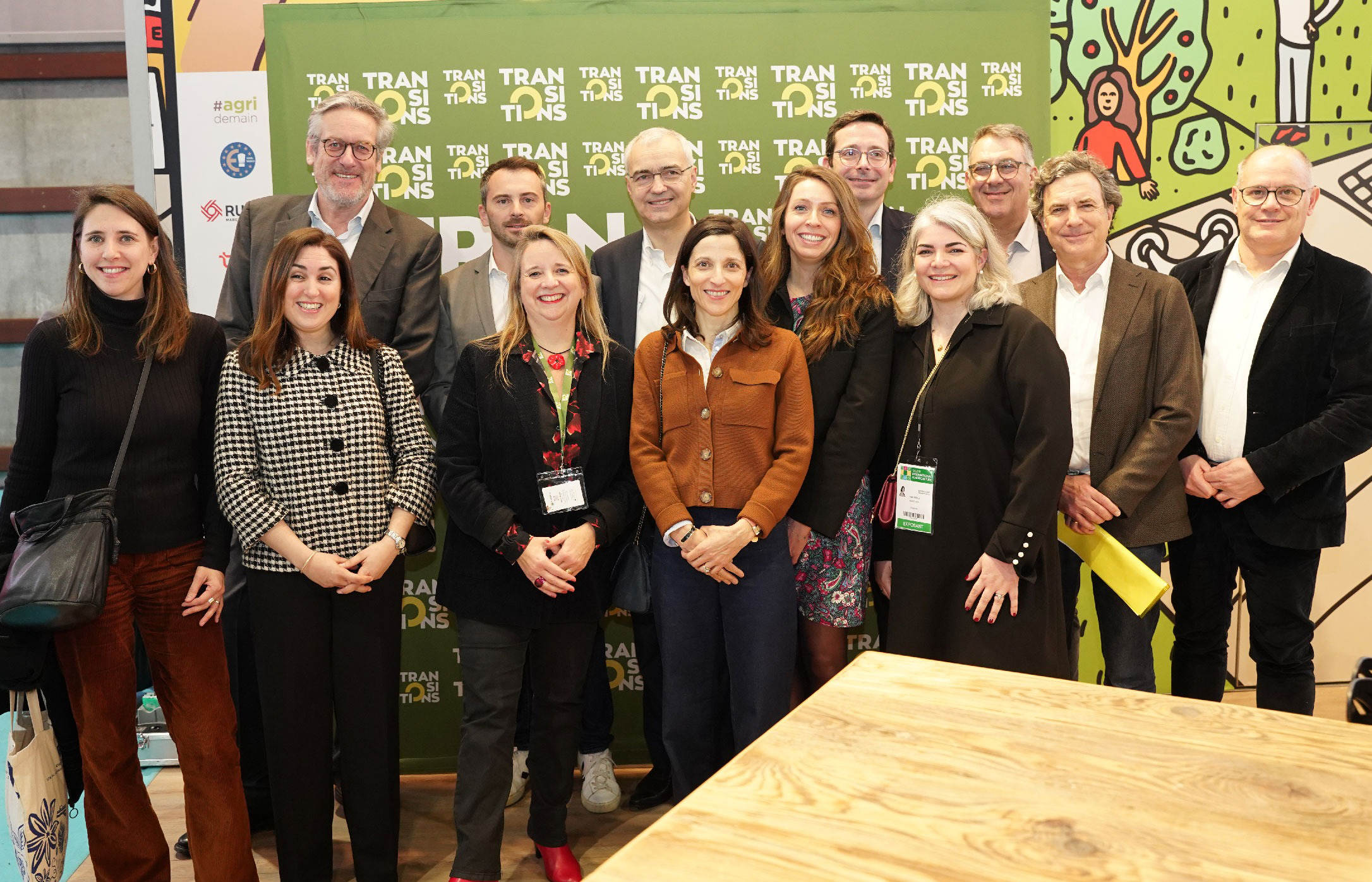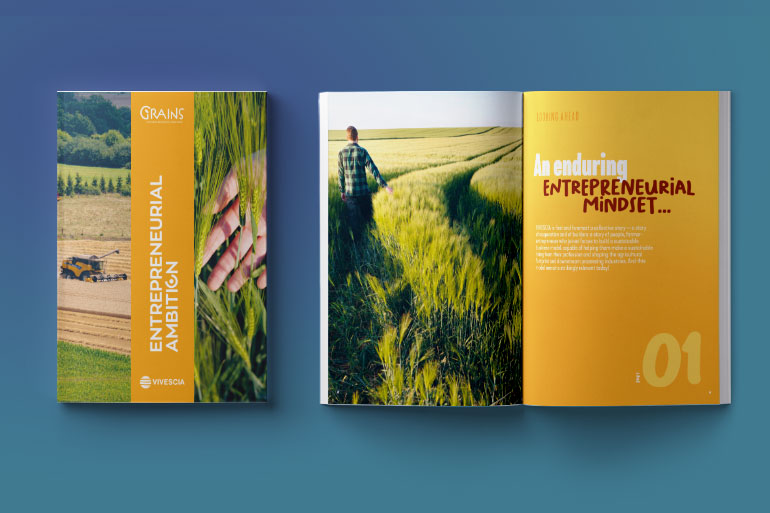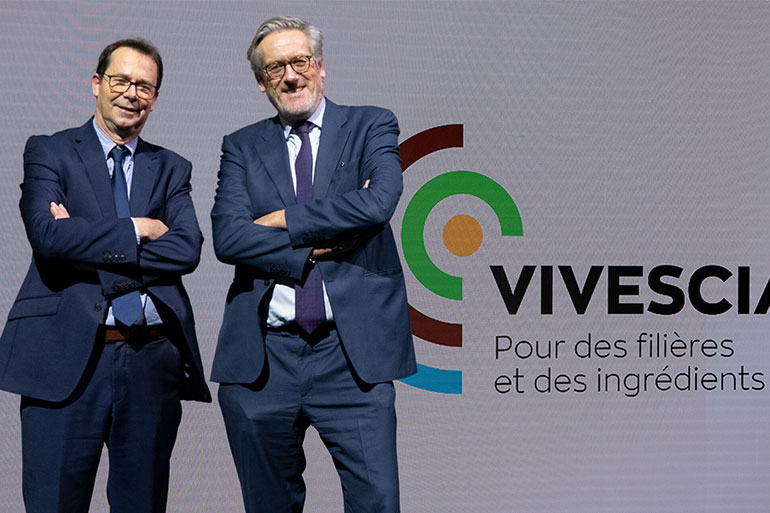
VIVESCIA Group & UniLaSalle launch a research chair entitled “resilient farms that benefit the climate and biodiversity”
Their shared objective is to promote the agro-ecological, low-carbon transition by growing our knowledge and stimulating innovation in this domain.
This joint research chair with INRAE is fully in line with the TRANSITIONS programme, led by VIVESCIA and its partners.

Launch of the research chair at the Paris agricultural fair, on 26 February 2024
From left to right: Etienne Mignot - Agricultural Engineer, VIVESCIA Cooperative ; Christian Huyghe - Scientific Director for Agriculture, INRAE ; Philippe Choquet, Managing Director, UniLaSalle ; Christoph Büren, President of VIVESCIA Group ; Savine Oustrain - Director of Research and Agronomic Innovation, VIVESCIA Cooperative ; Michel-Pierre Faucon - Deputy Director of Research, UniLaSalle ; Valérie Frapier, CSR & TRANSITIONS programme Director, VIVESCIA Group
Christoph Büren, President of VIVESCIA Group, said, “TRANSITIONS is an innovative, evidence-based programme that capitalises on knowledge acquired in the field. It aims, by 2026, to help nearly 1,000 farmers from our region transition to productive, low-carbon agriculture that protects our soil and biodiversity. A fundamental partnership for VIVESCIA, this research chair with UniLaSalle will drive solutions and progress for TRANSITIONS and our entire value chain.”
Philippe Choquet, Chief executive of engineering and veterinary school UniLaSalle, said: “This research chair is an historic collaboration between VIVESCIA and UniLaSalle that will combine our scientists’ expertise with that of VIVESCIA’s farmers and employees to adapt food production systems to the challenges of climate change.”
One of the primary challenges in agriculture is adapting to climate change while preserving yields, enhancing soil organic matter, reducing greenhouse gas (GHG) emissions and mitigating impacts on biodiversity. Reducing agriculture’s environmental footprint, including GHG emissions and effects on biodiversity, will require the development of agro-ecological practices alongside environmentally friendly technologies. A key way to accelerate this transition involves by adopting agro-ecological principles into agricultural systems.
Christian Huyghe, Scientific director for agriculture at INRAE, added “French and European agriculture will have to reconcile the need for profitable, high-yield farming with the protection of biodiversity and resilience against climate change. For that, we will need to work with growers and food processors in every region to profoundly rethink our agricultural and food production systems. By exploiting functional diversity, agro-ecology provides opportunities to adapt to local conditions. UniLasalle is joining forces with VIVESCIA and its TRANSITIONS programme in an industrial research chair that — alongside other national research institutes and universities — will train tomorrow’s stakeholders and decision-makers.”
A new chapter in the UniLaSalle / VIVESCIA partnership
UniLaSalle trains future agronomic, food processing, agricultural and environmental engineers in VIVESCIA’s region (the Marne, Aube, and Ardennes departments in particular). The TRANSITIONS programme, led by VIVESCIA, will form the foundations of a new phase of closer, more long-term scientific cooperation. The long-standing relationship, the shared history and a community of values centred on commitment and teamwork are key elements that enabled dialogue to be initiated quickly, resulting in this extensive research chair project in under six months.
A living laboratory made up of diverse farms, soil types and plants
At academic level, this partnership with and for farmers will result in the production of knowledge (creation of databases and guides, seminars, conferences and articles), tools and methods (cover crop management tool, definition of future experiments, evaluation of the impact of practices and permanent infrastructures to restore biodiversity). ”Our multidisciplinary approach involves dialogue between multiple actors — not an attitude of the all-knowing scientist – because we believe that VIVESCIA’s farmers and experts have just as much to contribute as researchers, and that our know-how is complementary…” adds Michel-Pierre Faucon, Delegate director for research at UniLaSalle
“Our success will depend on teamwork between farmers, VIVESCIA and UniLaSalle,” he adds. “This is above all a collaborative effort, and our shared experience will create synergies!”
Research based on the sustainability and resilience of our farming systems and regions
This four-year project aims to identify farming practices from VIVESCIA’s territories that mitigate the effects of climate change and facilitate the adaptation of farming systems.
“You can’t improve what you can’t measure. Experimentation and data analysis are crucial to the evolution of farming systems. And where there is change, there is risk, so we need to be capable of measuring it to anticipate it,” underlines Etienne Mignot, Agronomic engineer at VIVESCIA Cooperative and agronomic lead for the TRANSITIONS programme. “We want to develop a systemic view, which involves mobilising a wide range of know-how and expertise to offer innovative solutions that are tailored to our regions, and which take into account the human and organisational reality on the ground. This research chair will act as a real accelerator,” adds Savine Oustrain, Director of research and agronomic innovation at VIVESCIA Cooperative.
It has four main objectives:
- To identify resilient varieties with good yields, and farming methods that will best allow crops to adapt to climate change.
- To reduce farming systems’ greenhouse gas emissions by identifying combinations of agro-ecological practices.
- To maximise the production of biomass through cover crops and their eco-systemic services.
- To design or adapt a method for assessing farms’ biodiversity regeneration.
Launched by VIVESCIA and its partners in September 2023, TRANSITIONS is the first high-impact programme of its kind in France. It is a collective effort that brings together upstream and downstream plant and grain industries with an ambitious, innovative agronomic approach and financing model. The aim is, by 2026, to help nearly 1,000 farmers in North-east France transition to regenerative, productive farming methods that promote soil health and biodiversity to protect the planet and combat climate change. 200 VIVESCIA cooperative members have committed to the project for three years, starting with the 2024 harvest.



